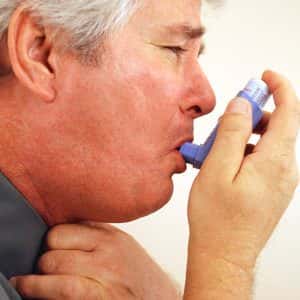
A study in England has shown that a common asthma drug, budesonide (Pulmicort), may help older people recover from COVID-19 more quickly. Early in the pandemic clinicians worried that people with asthma or other lung problems would be especially susceptible to the ravages of the coronavirus. Surprisingly, though, they actually seemed to be at lower risk for severe complications. One hypothesis focuses on the inhaled corticosteroids such patients routinely take. There is growing data to support budesonide vs. COVID-19.
The PRINCIPLE Trial: Budesonide vs COVID-19:
Researchers at the University of Oxford began the PRINCIPLE trial a year ago. Data from the PRINCIPLE trial were presented in a preprint to get the information out to practitioners promptly (MedRxiv, April 12, 2021).
Participants with suspected COVID-19 were randomized to receive the inhaled corticosteroid budesonide, usual care or other interventions. More than 2,600 people participated.
Patients using the corticosteroid inhaler recovered three days faster, on average, than those on usual care. In addition, only 8.5% of patients in the budesonide group required hospitalization compared to 10.3% of those under usual care.
The Guardian (April 12, 2021) has reported that one of the chief researchers stated that the study:
“has found evidence that a relatively cheap, widely available drug with very few side-effects helps people at higher risk of worse outcomes from Covid-19 recover quicker, stay better once they feel recovered, and improves their wellbeing.
“We therefore anticipate that medical practitioners around the world caring for people with Covid-19 in the community may wish to consider this evidence when making treatment decisions, as it should help people with Covid-19 recover quicker.”
Inhaled steroids are commonly used in the treatment of both asthma and COPD, and budesonide is widely available at reasonable cost.
Another investigator in the PRINCIPLE study added this:
“For the first time we have high-quality evidence of an effective treatment that can be rolled out across the community for people who are at most risk of developing more severe illness from Covid-19.
“Unlike other proven treatments, budesonide is effective as a treatment at home and during the early stages of the illness. This is a significant milestone for this pandemic and a major achievement for community-based research.”
Drugs vs COVID-19:
We have been interested in finding effective treatments for COVID-19 since the earliest days of the pandemic. We have written about the anti-parasite drug ivermectin at this link. To date, we do not have a magic bullet against COVID-19, but there are promising treatments on the horizon.
In the next few weeks we should learn about the results of a clinical trial involving a new medicine called molnupiravir (EIDD-2801 – MK-4482).
On April 5, 2021, Merck and Ridgeback Biotherapeutics offered a tantalizing peek into their study:
“We are pleased that molnupiravir continues to show promise as a potential treatment for non-hospitalized patients with COVID-19,” said Wendy Holman, Chief Executive Officer, Ridgeback Biotherapeutics. “Data from Ridgeback Bio’s EIDD-2801-2003 study (MK-4482-006) coupled with Merck’s MK-4482-002 study provide compelling evidence for the antiviral activity of molnupiravir. We look forward to the initiation and completion of the Phase 3 portion of the MOVe-OUT study.”
“The percentage of patients who were hospitalized and/or died in Part 1 of the MOVe-OUT study was lower in the combined molnupiravir-treated groups versus the placebo arm; the number of events reported are not sufficient to provide a meaningful measure of clinical effect. Analysis of SARS-CoV-2 in nasopharyngeal and oropharyngeal swabs from patients in both MOVe-OUT and MOVe-IN using quantitative and qualitative polymerase chain reaction, an exploratory endpoint, indicated that molnupiravir inhibits replication of the virus, as demonstrated by a greater decrease from baseline in viral RNA compared to placebo at Day 5 and Day 10, and by a larger proportion of participants with undetectable viral RNA at Day 10 and Day 15 following the end of treatment.”
If the data are positive:
“Merck currently anticipates that, pending favorable results from MOVe-OUT, the earliest possible submission for an Emergency Use Authorization for molnupiravir will be in the second half of 2021.”
It will take a few more weeks to determine whether this new antiviral is truly effective. In the meantime, there is hope that budesonide vs COVID-19 may be a helpful strategy for some patients.

